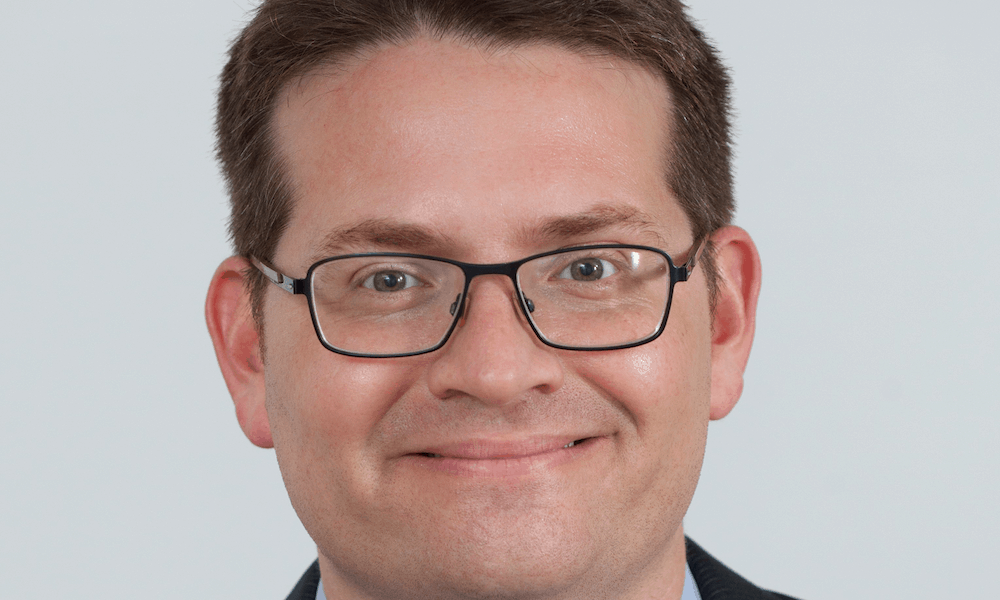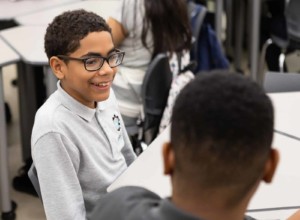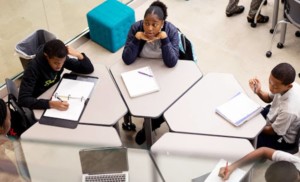Podcast: Eric Tucker on Reopening Schools with Equity in Mind

It was debate that interrupted the boredom of junior high for Eric Tucker. The motivation of developing and presenting a clearly stated point of view motivated his academic success. In competitive high school debate he “fell in love with political reasoning for evidence-based cases.”
During his undergraduate studies at Brown, he co-founded the National Association for Urban Debate Leagues. He served as a chief academic officer for the organization even while earning a doctorate in measurement at Oxford.
He moved to Brooklyn 11 years ago to help the Federal Reserve think through an education response to the Great Recession. He met technologist Erin Mote, who was looking for her next contribution after leaving the White House. Together they founded Brooklyn LAB with the goal of bringing world-class education to “prepare young people for purposeful adult life” to Fort Green and downtown Brooklyn.
LAB is a rigorous and personalized middle and high school. Forty tutors provide small group instruction in reading and math as part of a multiple-year residency where they earn a master’s degree in a content area and special education. “By investing in professional learning and growth, we have been able to build a great faculty and teaching corps,” said Tucker.
Nearly all LAB learners live in or near poverty and almost a third have complex needs. The Brooklyn LAB community was hard hit by the pandemic. Many students and faculty members lost loved ones. “It’s been a harrowing two months,” said Tucker.
The school won an XQ grant in 2016 and remains an important contributor to this network of laboratory schools.
A Plan to Reopen Schools
In the last few weeks, the complexity and seriousness of reopening schools began to surface. During the last week of April, Tucker solicited advice from national experts particularly those representing learners with complex needs. A 10 point plan to reopen schools was published on April 29. Erik commented on the plan (starting at the 20-minute mark).
- Organize and mobilize. “The work of response to families in need has been a huge focus at the LAB.” That’s why it was important for everybody to create a team that serves as nerve center during the crisis.
“We’re newly aware of the need to provide childcare. May professionals are balancing caregiver responsibilities and work. And being effective at childcare, with a different mix of goals, requires that we prepare differently.”
- Develop reopening scenarios. “Reopening with distancing is difficult or impossible in buildings fortified to prevent shooting.”
“We’re looking at A/B days or morning/afternoon shifts as well as place shifts.” In addition to time and place shifting, he anticipates the need to operate remote learning.
“Many students have medically fragile individuals at home so any plan can’t just focus on the student–it’s a life and death matter.”
Tucker talked about the importance of preparation for screening on entry and contract tracing. “Success will be a function of how effective our collective public health response will be.”
- Embrace financial stewardship in the face of uncertainty. Tucker encouraged Creative thinking while preparing for devastating budget cuts. He’s keeping in mind that equity doesn’t mean the same set of resources for every learner.
“We’ll try to match resources to goals and avoid balancing budgets on the back of the most vulnerable students.”
- Staff and schedule for flexibility and differentiation. “Staff and facilities are our main expenses–and we will require more staff and more facilities next year.”
Tucker stresses the need for frequent and direct communication with all stakeholders during the crisis.
- Reconnect and reassess. “Reconnecting is critical in the context of profound trauma. This has been a taxing period physically, emotionally, and in terms of personal safety”
“We’ll be using diagnostics to assess where students are and taking lessons from Turnaround for Children and CASEL and guidance from National Center on Learning Disabilities. As we diagnosis learning gaps, we’ll keep in mind learner variability.”
- Practice agency and prioritize engagement. “Some things matter more in virtual learning including agency, self-management, and good decision making.”
- Make use of data and systems to improve educational continuity. “Accessibility of technology matters.”
Tucker stressed the importance of the interoperable exchange of data when learners are moving from one setting to another.
- Reimagine approaches to core school systems. “Schools should consider moving to mastery and competency grading and allowing the revision of work.”
“Schools will also need to rethink talent systems.”
- Iterate and communicate. “Schools need to communicate and prepare for the possibility of periodic resurgences that could continue over the next couple of years. We must develop strategies, including reinstituting mitigation measures, to ensure the protection of educators, students, and families when the disease surges.”
- Consider the worst but model the best. “We must acknowledge the humanitarian disaster underway, apply all of our best thinking and problem solving to provide consistent access to food, health care, stages of grieving,
“Modeling the best entails recognizing the once in a generation opportunity to rethink what one people
Key Takeaways:
[2:22] Where did Eric’s appreciation for debate come from? And when did it start?
[5:30] How and when did Eric end up at Oxford getting his master’s in education research methodology and his doctorate in measurement?
[7:23] After leading the National Debate organization and doing a few other things, Eric had an idea of starting a new kind of school in the heart of Brooklyn. Eric tells the origin story of Brooklyn Lab.
[10:44] Now a well-known school, Brooklyn Lab serves a diverse group of students. Eric touches on this fact and elaborates on the unique needs of the student population.
[15:44] Eric speaks about how they make 1:1 and small group tutoring a priority at Brooklyn Lab.
[18:15] Jessica shares an important resource with listeners: the Getting Through microsite.
[18:55] Eric provides some reflections on what’s currently happening at Brooklyn Lab concerning the COVID-19 pandemic.
[25:50] Eric begins to speak about their 10-point plan for reopening schools with safety and equity in mind.
[30:14] Eric highlights some of the permutations that they’re looking at, at Brooklyn Labs, in terms of potential reopening scenarios.
[34:49] Eric summarizes their approach to budgeting and staffing when it comes to reopening schools.
[39:42] Eric speaks about what the first week back at school might look like and what he encourages school leaders to be thinking about.
[43:29] In the 7th and 8th point in the plan, they speak about using data to improve continuity as well as reimagining approaches to core services. Eric further elaborates on these points.
[47:52] In the last two points of their 10-point plan, Tom and Eric encourage school and system leaders to iterate and communicate and to consider the worst but model the best. Eric elaborates on what he meant by “consider the worst” and gives his thoughts on how we should think about future possibilities and factor them into our plans while continuing to forge ahead.
Mentioned in This Episode:
GettingSmart.com/GettingThrough
Brooklyn Laboratory Charter School
“How to Reopen Schools: A 10-Point Plan Putting Equity at the Center,”
by Eric Tucker and Tom Vander Ark
i-Ready
WAMAP
National Center for Learning Disabilities (NCLD)
For more see:
- America’s Edu Power Couple On Balancing Innovation and Execution (2017 podcast with Eric Tucker & Erin Mote)
- How to Reopen Schools: A 10-Point Plan Putting Equity at the Center (Eric Tucker & Tom Vander Ark)
- To Reopen, America Needs Laboratory Schools (Eric Tucker & Erin Mote)
Stay in-the-know with innovations in learning by signing up for the weekly Smart Update.
Getting Smart has launched the Getting Through series to support educators, leaders, and families on the path forward during such an uncertain time. This series will provide resources and inspiration as we face long term school closures, new learning environments, and address equity and access from a new lens. Whether you are just getting started with distance or online learning, or you’ve had plans in place and have the opportunity to share your work and guidance with others, there is a place for your voice and an opportunity to learn.






0 Comments
Leave a Comment
Your email address will not be published. All fields are required.